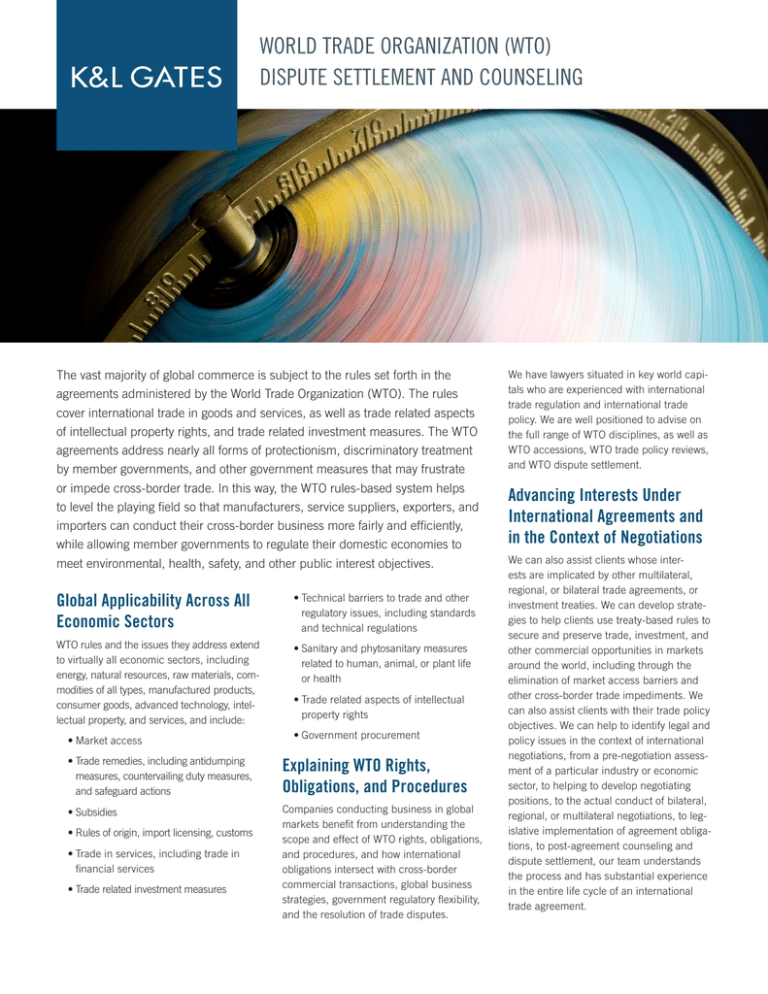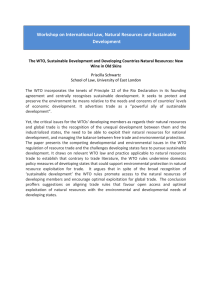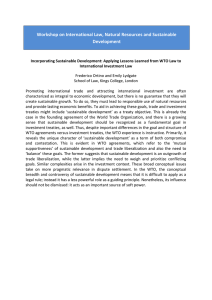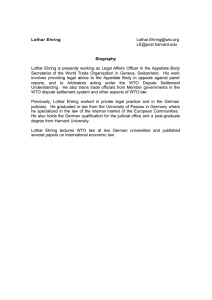WORLD TRADE ORGANIZATION (WTO) DISPUTE SETTLEMENT AND COUNSELING
advertisement

WORLD TRADE ORGANIZATION (WTO) DISPUTE SETTLEMENT AND COUNSELING The vast majority of global commerce is subject to the rules set forth in the agreements administered by the World Trade Organization (WTO). The rules cover international trade in goods and services, as well as trade related aspects of intellectual property rights, and trade related investment measures. The WTO agreements address nearly all forms of protectionism, discriminatory treatment by member governments, and other government measures that may frustrate or impede cross-border trade. In this way, the WTO rules-based system helps to level the playing field so that manufacturers, service suppliers, exporters, and importers can conduct their cross-border business more fairly and efficiently, while allowing member governments to regulate their domestic economies to meet environmental, health, safety, and other public interest objectives. Global Applicability Across All Economic Sectors • Technical barriers to trade and other regulatory issues, including standards and technical regulations WTO rules and the issues they address extend to virtually all economic sectors, including energy, natural resources, raw materials, commodities of all types, manufactured products, consumer goods, advanced technology, intellectual property, and services, and include: • Sanitary and phytosanitary measures related to human, animal, or plant life or health • Market access • Trade related aspects of intellectual property rights • Government procurement • Trade remedies, including antidumping measures, countervailing duty measures, and safeguard actions Explaining WTO Rights, Obligations, and Procedures • Subsidies Companies conducting business in global markets benefit from understanding the scope and effect of WTO rights, obligations, and procedures, and how international obligations intersect with cross-border commercial transactions, global business strategies, government regulatory flexibility, and the resolution of trade disputes. • Rules of origin, import licensing, customs • Trade in services, including trade in financial services • Trade related investment measures We have lawyers situated in key world capitals who are experienced with international trade regulation and international trade policy. We are well positioned to advise on the full range of WTO disciplines, as well as WTO accessions, WTO trade policy reviews, and WTO dispute settlement. Advancing Interests Under International Agreements and in the Context of Negotiations We can also assist clients whose interests are implicated by other multilateral, regional, or bilateral trade agreements, or investment treaties. We can develop strategies to help clients use treaty-based rules to secure and preserve trade, investment, and other commercial opportunities in markets around the world, including through the elimination of market access barriers and other cross-border trade impediments. We can also assist clients with their trade policy objectives. We can help to identify legal and policy issues in the context of international negotiations, from a pre-negotiation assessment of a particular industry or economic sector, to helping to develop negotiating positions, to the actual conduct of bilateral, regional, or multilateral negotiations, to legislative implementation of agreement obligations, to post-agreement counseling and dispute settlement, our team understands the process and has substantial experience in the entire life cycle of an international trade agreement. “We are well positioned to advise on the full range of WTO disciplines, as well as WTO accessions, WTO trade policy reviews, and WTO dispute settlement.” Representing Private Sector Interests and Member States in All Facets of WTO Litigation Finally, when other approaches are ineffective, we have experience in representing private sector interests and governments in all phases of WTO dispute settlement, including: • Assessment of national measures to determine WTO inconsistencies and the viability of WTO challenges and defenses • Formal consultations (including the preparation of written requests for consultations and advice and assistance regarding the conduct of governmentto-government consultations) • Panel proceedings (including the preparation of requests to establish a panel, advice and guidance on panel composition, dealing with requests for preliminary rulings from the panel, the preparation of legal submissions and responses to written panel questions, and oral advocacy before the panel) • Appeals before the WTO Appellate Body (including analysis of panel reports to determine potential bases for appeal, the preparation of notices of appeal and notices of other appeal, the preparation of appellee and appellant submissions, and oral advocacy before the Appellate Body) • Arbitrations to determine the period of time for a member government to implement WTO rulings based on adopted panel reports and Appellate Body reports • Domestic implementation of WTO rulings based on adopted panel reports and Appellate Body reports • Compliance proceedings (when there is a dispute as to the existence or WTO consistency of measures taken to comply with WTO rulings) • Proceedings to suspend tariff concessions or other obligations (retaliation proceedings in the event that the losing WTO member fails to bring itself into compliance) Learn more about our World Trade Organization (WTO) Dispute Settlement and Counseling practice at klgates.com. Washington DC Frank Schweitzer +1.202.778.9488 frank.schweitzer@klgates.com 11809 Contacts: Anchorage Austin Beijing Berlin Boston Brisbane Brussels Charleston Charlotte Chicago Dallas Doha Dubai Fort Worth Frankfurt Harrisburg Hong Kong Houston London Los Angeles Melbourne Miami Milan Moscow Newark New York Orange County Palo Alto Paris Perth Pittsburgh Portland Raleigh Research Triangle Park San Diego San Francisco São Paulo Seattle Seoul Shanghai Singapore Spokane Sydney Taipei Tokyo Warsaw Washington, D.C. Wilmington K&L Gates practices out of 48 fully integrated offices located in the United States, Asia, Australia, Europe, the Middle East and South America and represents leading global corporations, growth and middle-market companies, capital markets participants and entrepreneurs in every major industry group as well as public sector entities, educational institutions, philanthropic organizations and individuals. For more information about K&L Gates or its locations, practices and registrations, visit www.klgates.com. This publication is for informational purposes and does not contain or convey legal advice. The information herein should not be used or relied upon in regard to any particular facts or circumstances without first consulting a lawyer. ©2014 K&L Gates LLP. All Rights Reserved.




